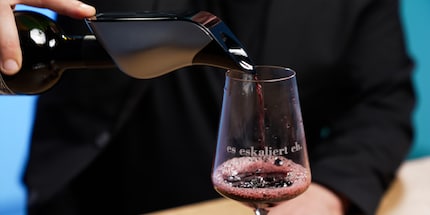
Let it breathe: testing the Aveine wine aerator
It takes hours to carafe a good wine. This Aveine wine aerator, however, is supposed to save you the time. So is this small, pricey gismo any good? I sat down with wine expert Engin Erler to put it to the test.
It was two weeks ago in the hallway of my apartment building that I noticed the reflective time of year had begun. The building managers had hung up a notice decorated with autumnal Clip Art wishing us all the best for the season. This masterpiece of graphic design has since given way to two austere pages titled «Proper Ventilation». Using four bullet points, the notice states that short, intense ventilation sessions can improve the climate of a room in winter without your heating bill skyrocketing.
Proper ventilation means keeping all the windows wide open for five to ten minutes. Cross ventilation (briefly creating a draught through the rooms) proves particularly effective.
A breath of fresh air
What’s true of my apartment in winter is also true of wine: it needs air. Red wine especially needs to be decanted into a carafe and left to breathe for at least an hour. There’s now a device that sets out to do this in seconds. Oxygen helps the aroma of the wine to develop. The tannins in young wines in particular seem more harmonious, leaving less of a furry feeling on the tongue. Sadly, I’ve already been waiting for years for the building managers to pin up a «Proper Aeration of Wine» notice in the hallway, so I hazard my own attempt.
Proper aeration means oxygenating the wine from anywhere between one to twenty-four hours (aeration). When doing this, it’s particularly effective to pour the wine into a separate container (caraffing).
It won’t be lost on all you attentive readers that there’s a crucial difference between airing an apartment and airing wine. While an apartment can be ventilated in a few minutes, caraffing a wine takes at least an hour. A problem that Aveine has got wind of as well.

Once you’ve opened the wine, you stick the device into the yet unaerated bottle. When the wine is poured, it flows through the device and is flushed with oxygen. There’s also a display where you can set the duration of the simulated airing process. The time spans range from one to twenty-four hours, though pouring the wine always takes the same amount of time. An app allows you to scan the labels of the wines you’re serving, setting the appropriate aeration time automatically.
Regardless of whether I’ve opted for one or twenty-four hours of aeration, the wine trickles out instantly when poured. According to the manufacturer, this is made possible by oxygen enrichment, otherwise used in the medical field for heart operations. There’s no gas cylinder necessary – you can just charge the device using the included charging station with micro-USB port (yes, a micro-USB in 2022).

Source: Valentina Sproge
Seeing as I enjoy drinking wine, but never air it, I got an expert to help me out. Engin Erler, Head of Sales at Von Salis Weine put himself forward for a blind taste test. Together, we chose wines from three different price ranges, as we wanted to make sure the aerator worked on any wine.
Not just a load of hot air
Engin instantly recognised the aerated wine in all three cases, saying, «This is genuinely astounding. The wines seem like they’ve been able to air for hours.» Does that mean he’d recommend buying the Aveine? «At over 400 francs, it’s too expensive for me. But it could definitely be a meaningful investment for wine lovers,» he says.
Whether it’s wine or your own four walls, it’s possible to give both a good airing. So, if you’ve got the necessary cash, you can enjoy a nicely aired red wine in a nicely aired apartment. Cheers!
When I flew the family nest over 15 years ago, I suddenly had to cook for myself. But it wasn’t long until this necessity became a virtue. Today, rattling those pots and pans is a fundamental part of my life. I’m a true foodie and devour everything from junk food to star-awarded cuisine. Literally. I eat way too fast.





